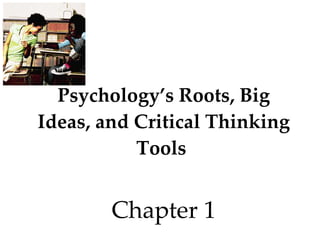
Chapter 1
- 1. Psychology’s Roots, Big Ideas, and Critical Thinking Tools Chapter 1
- 8. Psychological Science is Born Wundt and psychology’s first graduate students studied the “atoms of the mind” by conducting experiments at Leipzig, Germany, in 1879. This work is considered the birth of psychology as we know it today. Wundt (1832-1920)
- 9. Psychological Science is Born American philosopher William James wrote an important 1890 psychology textbook. Mary Calkins, James’s student, became the APA’s first female president. James (1842-1910) Mary Calkins
- 10. Psychological Science is Born Sigmund Freud, an Austrian physician, and his followers emphasized the importance of the unconscious mind and its effects on human behavior. Freud (1856-1939)
- 11. Psychological Science is Born Psychology originated in many disciplines and countries. It was, until the 1920s, defined as the science of mental life.
- 16. Psychology’s Three Main Levels of Analysis
- 17. Psychology’s Current Perspectives Perspective Focus Sample Questions Neuroscience How the body and brain enables emotions? How are messages transmitted in the body? How is blood chemistry linked with moods and motives? Evolutionary How the natural selection of traits the promotes the perpetuation of one’s genes? How does evolution influence behavior tendencies? Behavior genetics How much our genes and our environments influence our individual differences? To what extent are psychological traits such as intelligence, personality, sexual orientation, and vulnerability to depression attributable to our genes? To our environment?
- 18. Psychology’s Current Perspectives Perspective Focus Sample Questions Psychodynamic How behavior springs from unconscious drives and conflicts? How can someone’s personality traits and disorders be explained in terms of sexual and aggressive drives or as disguised effects of unfulfilled wishes and childhood traumas? Behavioral How we learn observable responses? How do we learn to fear particular objects or situations? What is the most effective way to alter our behavior, say to lose weight or quit smoking?
- 19. Psychology’s Current Perspectives Perspective Focus Sample Questions Cognitive How we encode, process, store and retrieve information? How do we use information in remembering? Reasoning? Problem solving? Social-cultural How behavior and thinking vary across situations and cultures? How are we — as Africans, Asians, Australians or North Americans – alike as members of human family? As products of different environmental contexts, how do we differ?
- 20. Psychology’s Subfields: Research Psychologist What she does Biological Explore the links between brain and mind. Developmental Study changing abilities from womb to tomb. Cognitive Study how we perceive, think, and solve problems. Personality Investigate our persistent traits. Social Explore how we view and affect one another.
- 21. Psychology’s Subfields: Research Data: APA 1997
- 22. Psychology’s Subfields: Applied Psychologist What she does Clinical Studies, assesses, and treats people with psychological disorders Counseling Helps people cope with academic, vocational, and marital challenges. Educational Studies and helps individuals in school and educational settings Industrial/ Organizational Studies and advises on behavior in the workplace.
- 23. Psychology’s Subfields: Applied Data: APA 1997
- 27. What About Intuition & Common Sense? Many people believe that intuition and common sense are enough to bring forth answers regarding human nature. Intuition and common sense may aid queries, but they are not free of error.
- 31. The Scientific Attitude The scientific attitude is composed of curiosity (passion for exploration), skepticism (doubting and questioning) and humility (ability to accept responsibility when wrong).
- 39. Research Process
- 46. Descriptive Methods Case studies, surveys, and naturalistic observation describe behaviors. Summary
- 48. Correlation and Causation or Correlation does not mean causation!
- 58. Experimentation A summary of steps during experimentation.
- 59. Comparison Below is a comparison of different research methods.
Notas do Editor
- “ The soul is not separable from the body, and the same holds good of particular parts of the soul.” Aristotle, De Anima, 350 B.C.
- Preview Question 1: How has psychology’s focus changed over time?
- James admitted the first woman student Mary Calkins to Harvard and tutored her. Despite his efforts she was not able to attain her PhD from Harvard.
- Ivan Pavlov a Russian Physiologist, James Watson and Skinner were all instrumental in developing the science of psychology and emphasized behavior instead of mind or mental thoughts. From 1920 to 1960, psychology in the US was heavily oriented towards behaviorism.
- Preview Question 2: What are psychology’s current subfields?
- Although debates arise among the psychologists working from differing perspectives, each point of view addresses important questions.
- Preview Question 3: What four big ideas run through this book?
- Preview Question 4: Why are the answers reached by thinking critically more reliable than ordinary common sense?
- “ Anything seems commonplace, once explained.” Dr. Watson to Sherlock Holmes. Two phenomena – hindsight bias and judgmental overconfidence – illustrate why we cannot rely solely on intuition and common sense.
- Preview Question 5: What are the three key attitudes of scientific inquiry?
- Preview Question 6: How do psychologists construct theories?
- Preview Question 6: How do psychologists construct theories?
- Preview Question 7: What three techniques do psychologists use to observe and describe behavior?
- Preview Question 8: Why do correlations permit prediction but not explanation, and what is an illusory correlation?
- Preview Question 9: How do experiments clarify or reveal cause-effect relationships?
- Preview Question 10: How does research benefit from laboratory experiments?
- Preview Question 11: What ethical guidelines safeguard human and animal research participants?
- Preview Question 12: How are researchers influenced by their own values, and what is psychology’s ultimate purpose?